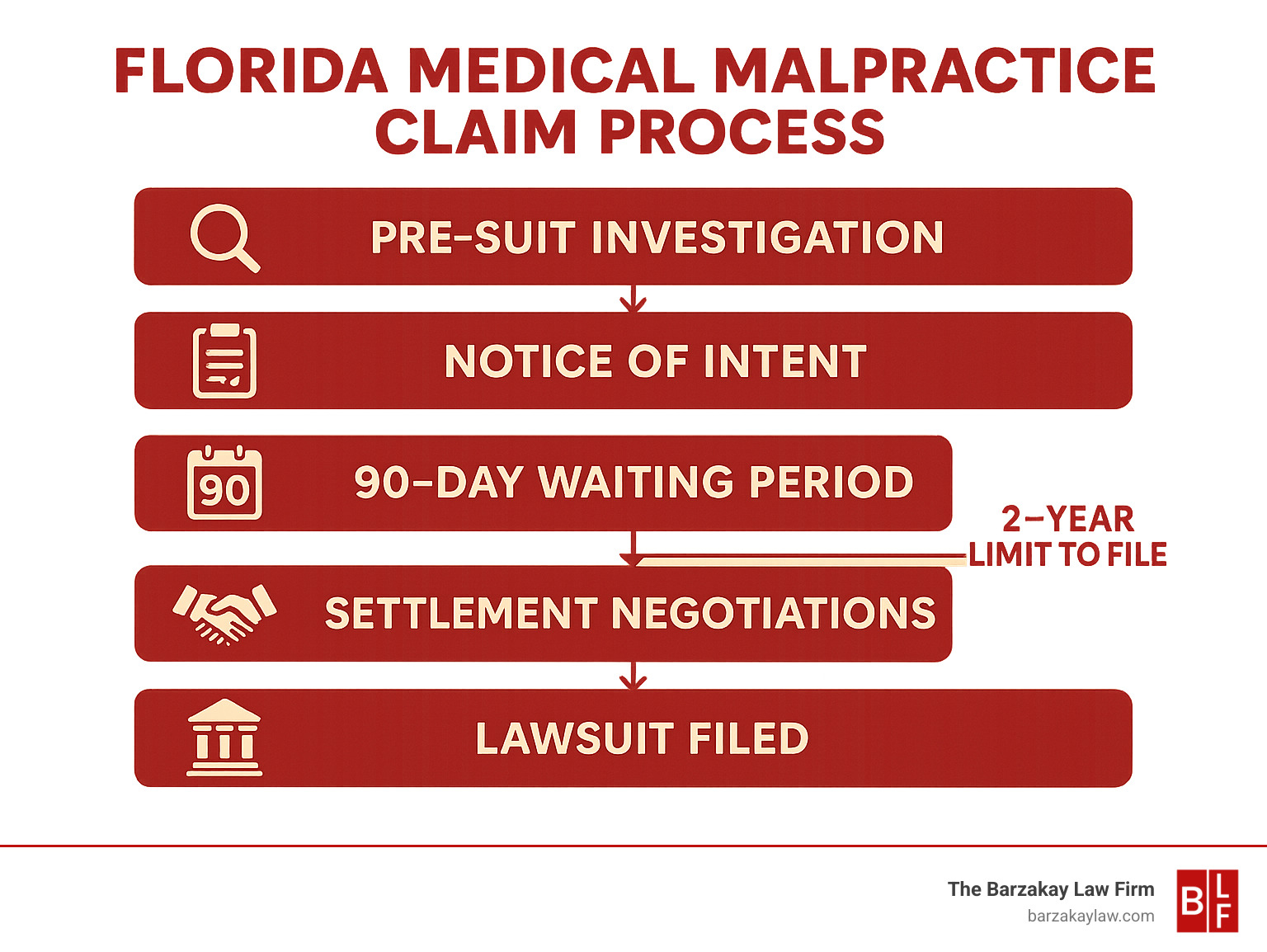Why Understanding Florida’s Medical Malpractice Process Matters
A medical malpractice claim Florida can feel overwhelming when you’re already dealing with the aftermath of medical negligence. If you’re facing mounting medical bills and wondering about your legal options, you need to understand how Florida’s unique legal process works.
Quick Answer for Florida Medical Malpractice Claims:
- File within 2 years of finding the injury (4-year maximum from the incident)
- Complete pre-suit investigation with medical professional review
- Send Notice of Intent to the healthcare provider
- Wait 90 days for settlement negotiations
- File lawsuit if no settlement is reached
- Prove four elements: duty of care, breach, causation, and damages
Florida has specific laws that make medical malpractice claims different from other injury cases. The state requires a mandatory pre-suit process before you can file a lawsuit. This means you must conduct a thorough investigation and give the healthcare provider advance notice of your claim before heading to court.
This process was created to reduce frivolous lawsuits and encourage settlements, but it adds problems for families seeking justice after preventable medical errors.
Medical malpractice occurs when a healthcare provider fails to meet the accepted standard of care, causing harm to a patient. This isn’t just about a bad outcome; it’s about proving that the provider’s actions fell below what other reasonable medical professionals would do in similar circumstances.
For families in South Florida dealing with medical negligence, understanding this process is the first step toward getting the compensation you deserve for medical expenses, lost wages, and pain and suffering.
What Constitutes Medical Malpractice in Florida?
When you trust a healthcare provider with your wellbeing, you expect them to follow established medical practices. A medical malpractice claim Florida becomes necessary when that trust is broken through negligence that causes you harm.
Medical malpractice isn’t just about a bad outcome. Medicine can be unpredictable, and not every negative result is due to negligence. Malpractice is about whether your healthcare provider met the prevailing professional standard of care. Florida law defines this as the level of care that a reasonably prudent healthcare provider would recognize as acceptable under similar circumstances.
To build a successful medical malpractice claim Florida, four essential elements must be proven:
- Duty of Care: A doctor-patient relationship existed, creating a duty to provide proper care.
- Breach of Duty: The provider’s actions (or failure to act) fell below the accepted standard of care.
- Causation: The breach of duty directly caused your injury.
- Damages: You suffered actual harm, such as medical bills, lost income, or pain and suffering.
You can find more details about a guide to the standard of care in Florida. For more information on pursuing these claims, learn more info about Medical Malpractice Lawyer Florida.
Common Examples of Medical Errors
Medical errors take many forms. Some of the most frequent in Florida malpractice cases include:
- Misdiagnosis or Delayed Diagnosis: Identifying the wrong condition or failing to diagnose a serious illness in time. A delayed cancer diagnosis, for example, can drastically alter a patient’s prognosis.
- Surgical Errors: These include operating on the wrong body part, leaving instruments inside a patient, or causing unnecessary nerve damage. While surgery has inherent risks, these errors fall outside acceptable practice.
- Anesthesia Mistakes: These can involve incorrect dosages or failure to monitor a patient, sometimes leading to a patient waking up during an operation.
- Medication Errors: Prescribing the wrong drug, an incorrect dosage, or medications that have dangerous interactions.
- Birth-Related Injuries: Negligence during delivery that causes permanent harm to the mother or baby. We have detailed information about Birth-Related Injuries Medical Malpractice.
- Failure to Obtain Informed Consent: Not adequately explaining the risks and benefits of a procedure, preventing a patient from making an informed decision.
How Liability is Determined
Figuring out who is responsible in a medical malpractice claim Florida can be complex, as modern healthcare involves teams of professionals.
- Doctors face direct liability for their personal actions, such as a misdiagnosis or surgical mistake.
- Hospitals can be held responsible for an employee’s negligence under “vicarious liability.” They can also be directly liable for issues like negligent hiring, understaffing, or failing to maintain equipment.
- Nurses can be negligent by failing to monitor patients, administering medication incorrectly, or not following a doctor’s orders.
- Lab technicians and other staff can be at fault for errors like mislabeling samples or misinterpreting test results, leading to improper treatment.
Determining fault requires a careful investigation of medical records and timelines to see where the breakdown in care occurred. Sometimes multiple parties share responsibility. The complexity of assigning liability is one reason why families in South Florida need legal guidance when pursuing these claims. For a broader perspective, you can read about determining liability in medical malpractice cases.
Navigating the Pre-Suit Process for a Medical Malpractice Claim in Florida
Florida’s legal system has a specific set of requirements you must complete before you can file a medical malpractice claim Florida in court. This “pre-suit” process is designed to encourage early settlements, but it adds layers of complexity.
Failure to follow these requirements, detailed in Florida Statutes, can lead to your case being dismissed. You can find the specific legal text for Florida’s pre-suit investigation requirements.
Here’s what the pre-suit process involves:
- Mandatory Investigation: We must conduct a thorough investigation, including reviewing medical records and consulting with a qualified medical professional, to confirm there are reasonable grounds for a claim.
- Notice of Intent to Initiate Litigation: Once our investigation confirms a good faith belief of negligence, we serve a “Notice of Intent” on each potential defendant, formally informing them of our intent to file a medical malpractice claim Florida.
- 90-Day Investigation Period: After the notice is served, a mandatory 90-day period begins. During this time, the potential defendants can investigate the claim, and no lawsuit can be filed. This period also extends the statute of limitations.
- Settlement Negotiations: This 90-day window is intended to facilitate settlement talks. If the claim is not resolved, we can then proceed with filing a lawsuit.
The Role of Testimony from Medical Professionals
In a medical malpractice claim Florida, testimony from a qualified medical professional is absolutely crucial. It forms the backbone of proving negligence.
Here’s why this testimony is so vital:
- Establishing Negligence: A medical professional provides an opinion on whether the healthcare provider breached the prevailing standard of care, explaining what a reasonably prudent provider would have done.
- Affidavit from a Medical Professional: Before serving the Notice of Intent, we must obtain a written affidavit from a qualified medical professional. This document states that the professional has reviewed the case and believes there are reasonable grounds to pursue a claim.
- Explaining Standard of Care to a Jury: During a trial, a medical professional can break down complex medical concepts into understandable terms for the jury.
- Proving Causation: They also help establish the link between the negligence and your injury, explaining how the breach of care directly caused the harm you suffered.
Finding the right medical professional to review a case is a critical step, as they must meet specific qualifications under Florida law. Our firm has a network of medical professionals to consult with, a vital asset in these cases. This is part of why we recommend seeking help from more info about Malpractice Attorneys Near Me.
Evidence Needed to Support Your Case
Building a strong medical malpractice claim Florida requires meticulous evidence gathering. Every piece is important to create a full picture of what happened.
Here’s the typical evidence we gather:
- Medical Records: The foundation of your claim. We collect all relevant records, including doctor’s notes, hospital charts, test results, and surgical reports.
- Bills and Receipts: To prove economic damages, we document all medical expenses, such as hospital bills, prescription costs, and therapy bills.
- Employment Records for Lost Wages: If the injury affected your ability to work, we use pay stubs, tax returns, and other documents to calculate lost income.
- Witness Statements: Statements from family, friends, or others who witnessed your care or the impact of your injury can be valuable.
- Photos or Videos of Injuries: Visual evidence can powerfully show the extent of your injuries.
- Documentation of Pain and Suffering: This can come from personal journals, therapy records, or testimony from those close to you.
Understanding Florida’s Deadlines for Filing
Time is a critical resource when pursuing a medical malpractice claim Florida. The statute of limitations acts like a closing door; once it shuts, it rarely reopens, regardless of the strength of your case.
Florida’s deadlines for medical malpractice cases are complex. Missing one by even a day can permanently bar you from seeking compensation. This is why we work closely with families throughout South Florida’s court systems—from Hollywood to Miami to Boca Raton—to help them steer these critical deadlines. For those in the Miami area, we’ve compiled specific resources about Medical Malpractice Attorneys in Miami.
What is the Statute of Limitations for a medical malpractice claim Florida?
Florida generally operates under a “two-year rule from findy,” with some important exceptions.
The two-year countdown typically begins when you find your injury and realize it was likely caused by medical negligence. This findy rule exists because many medical errors are not immediately obvious.
However, Florida also has a four-year statute of repose, which is an absolute deadline. This means you generally have no more than four years from the date the negligent medical care occurred, regardless of when you finded the injury. If you find malpractice three years after it happened, you only have one year left to file.
An exception for fraud or concealment can extend these deadlines. If a provider deliberately hid their mistake, you have two years from when you actually find the truth, with a seven-year maximum cap from the date of the incident.
Wrongful death claims have their own timeline, typically two years from the date of death.
The pre-suit investigation process automatically pauses these deadlines for 90 days, but it’s crucial not to rely on this extension. These timing calculations are tricky, and courts are strict about deadlines. You can find the legal text in Florida Statute 95.11, but we recommend having a legal professional review your specific situation.
Types of Damages You Can Recover
When we pursue a medical malpractice claim Florida, our goal is to secure the financial compensation you deserve. While no amount of money can undo the harm, damages are the legal system’s way of holding negligent parties accountable for the losses you’ve suffered.
Florida law allows you to recover different types of compensation for the ways medical negligence has affected your life, from medical bills to the impact on your daily happiness. For a deeper understanding of how we approach these cases, you can learn more info about a Medical Malpractice Claim Attorney.
Economic and Non-Economic Damages
Florida divides damages into two main categories:
Economic damages are tangible losses with a clear dollar amount. These include your medical bills (past and future), lost wages, and reduced future earning capacity. Future medical care is often a significant part of these damages, covering long-term rehabilitation, equipment, or lifetime care.
Non-economic damages address the intangible ways your injury has affected your quality of life. Pain and suffering compensation recognizes your physical and emotional distress. Loss of enjoyment of life covers your inability to participate in activities that once brought you joy. Your spouse may also have a claim for loss of consortium if the malpractice has affected your relationship.
Here’s how these damages typically break down:
| Economic Damages | Non-Economic Damages |
|---|---|
| Medical Bills (past & future) | Pain and Suffering |
| Lost Wages (past & future) | Loss of Enjoyment of Life |
| Rehabilitation & Therapy | Emotional Distress / Mental Anguish |
| Prescription Costs | Disfigurement |
| Home Modifications (if needed) | Physical Impairment |
| Out-of-Pocket Expenses | Loss of Consortium (for spouse) |
Importantly, the Florida Supreme Court struck down caps on non-economic damages in medical malpractice cases in 2017. This means there is currently no artificial limit on compensation for your pain and suffering in a medical malpractice claim Florida.
What Damages Can I Recover in a medical malpractice claim Florida?
In rare cases involving intentional misconduct or gross negligence, Florida law allows for punitive damages. These are not meant to compensate you for your losses but to punish the provider and deter similar behavior in the future.
Proving entitlement to punitive damages is difficult. Even when awarded, Florida has statutory caps, typically limiting them to $500,000 or three times your compensatory damages, whichever is greater. While possible, our primary focus is on securing full compensation for the actual economic and non-economic losses you have suffered.
Frequently Asked Questions about Florida Medical Malpractice Claims
When you’re dealing with the aftermath of medical negligence, questions naturally arise. We’ve helped many families throughout South Florida—from Fort Lauderdale to Sunrise to Orlando—steer these challenging situations.
How much does it cost to hire a lawyer for a medical malpractice case?
Most medical malpractice attorneys, including our firm, work on a contingency fee basis. This means you pay no attorney fees unless we recover compensation for you. Our fee is a percentage of the amount we win. This arrangement allows you to pursue justice without upfront financial strain. We are fully transparent about other case expenses, like filing fees or costs for medical records, during your initial consultation.
How long will my medical malpractice case take?
Every medical malpractice claim Florida has a unique timeline. The duration depends on factors like the complexity of the case, the number of parties involved, and whether the case settles or goes to trial. The mandatory 90-day pre-suit period is just the start. The findy phase, where evidence is gathered, can take many months. While many cases settle, a trial can extend the timeline significantly. We will keep you informed at every stage, as we understand the difficulty of waiting while dealing with medical and financial stress.
Can a hospital be sued for malpractice?
Yes. While individual doctors are often the focus, hospitals can be held responsible in a medical malpractice claim Florida. A hospital can be liable for an employee’s negligence through vicarious liability. This includes errors made by nurses, technicians, and other staff. Hospitals can also be directly at fault for issues like negligent hiring, understaffing that compromises patient safety, or failing to follow their own safety procedures and maintain equipment. It is common to name both the individual provider and the hospital in a lawsuit to ensure all responsible parties are held accountable.
Taking the Next Step in Your Claim
Pursuing a medical malpractice claim Florida is a complex process with strict deadlines and requirements. When you’re already dealing with the aftermath of a medical error, it can feel overwhelming. You shouldn’t have to figure this out on your own.
At The Barzakay Law Firm, we understand what you are going through. We have helped families throughout South Florida—from Hollywood to Miami, Boca Raton to Fort Lauderdale—steer these challenging cases. We know the local court systems and Florida’s unique medical malpractice laws.
We work on a contingency fee basis, which means you don’t pay us any attorney fees unless we win your case. We know medical bills may be piling up, and the last thing you need is to worry about legal costs upfront.
Our job is to handle the legal process, from gathering records and consulting with medical professionals to dealing with insurance companies, so you can focus on your health and your family. We believe in treating our clients with compassion and keeping them informed every step of the way.
If you are wondering whether you have a case or are unsure where to start, we invite you to talk with us. We offer free, confidential consultations to discuss what happened and help you understand your options.
Don’t let complex legal requirements or tight deadlines prevent you from seeking the justice your family deserves. Contact our personal injury attorneys in Hollywood for a free consultation today. We’re here to listen and ready to help.





